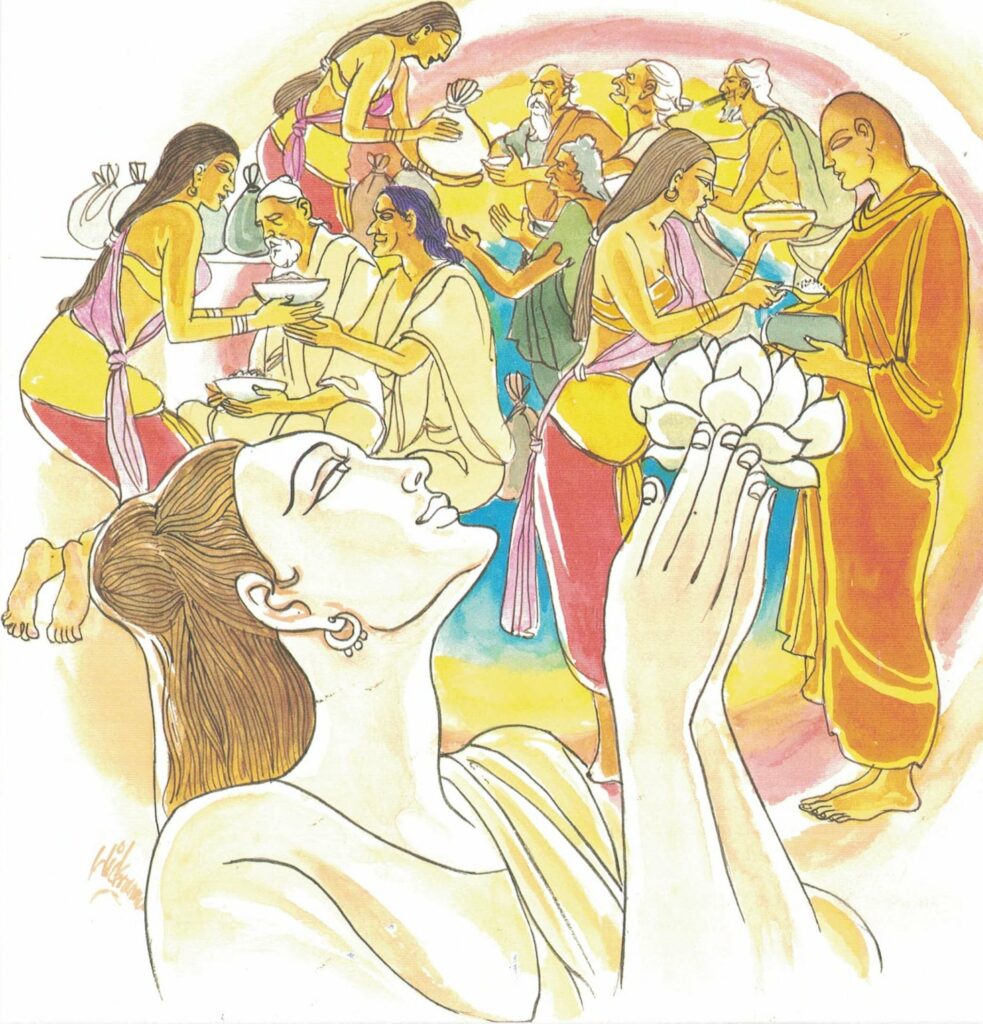Pali text, illustration and English translation of Dhammapada verse 118:
puññaṃ ce puriso kayirā kayirāth’etaṃ punappunaṃ |
tamhi chandaṃ kayirātha sukho puññassa uccayo || 118 ||
118. If one should some merit make do it then again, again. One should wish for it anew for merit grows to joy.

The Story of Goddess Lājā
While residing at the Jetavana Monastery, the Buddha spoke this Verse, with reference to the goddess Lājā.
For a while Venerable Kassapa the Great was in residence at Pipphalī Cave, he entered into a state of trance, remaining therein for seven days. Arising from trance on the seventh day, he surveyed with supernatural vision the places where he wanted to go for alms. As he looked abroad, he beheld a certain woman, the keeper of a field of rice-paddy, parching heads of rice which she had gathered. Thereupon he considered within himself, “Is she endowed with faith or is she not endowed with faith?” Straightaway becoming aware that she was endowed with faith, he reflected, “Will she be able to render me assistance?” Straightaway he became aware of the following, “This noble young woman is wise and resourceful; she will render me assistance, and as the result of so doing will receive a rich reward.” So he put on his robes, took bowl in hand, and went and stood near the rice-field. When this noble young woman saw the Venerable, her heart believed, and her body was suffused with the five sorts of joy. “Wait a moment, Venerable,” said she. Taking some of the parched rice, she went quickly to him, poured the rice into the Venerable’s bowl, and then, saluting him with the five rests, she made an earnest wish, saying, “Venerable, may I be a partaker of the Truth you have seen?” “So be it,” replied the Venerable, pronouncing the words of thanksgiving. Then that noble young woman saluted the Venerable and set out to return, reflecting upon the alms she had given to the Venerable.
Now in a certain hole by the road skirting the field of growing rice lurked a poisonous snake. He was not able to bite the Venerable’s leg, for it was covered with his yellow robe. But as that noble young woman reached that spot on her return, reflecting upon the alms she had given to the Venerable, the snake wriggled out of his hole, bit her, and then and there caused her to fall prostrate on the ground. Dying with believing heart, she was reborn in heaven. As a goddess she came down from time to time and attended to the upkeep of the Venerable’s place–cleaning the premises etc. When the Venerable saw what had been done, he concluded, “Some probationer or novice must have rendered me this service.” On the second day the goddess did the same thing again, and the Venerable again came to the same conclusion. But on the third day the Venerable heard the sound of her sweeping, and looking in through the keyhole, saw the radiant image of her body. And straightaway he asked, “Who is it that is sweeping?” “It is I, Venerable, your female disciple the goddess Lājā.” “I have no female disciple by that name.” “Venerable, when I was a young woman tending a rice-field, I gave you parched rice; as I returned on my way, a snake bit me, and I died with believing heart and was reborn in the Heavenly World. Since it was through you that I received this glory, I said to myself, ‘I will perform the major and minor duties for you and so make my salvation sure.’ Therefore came I hither, Venerable.” “Was it you that swept this place for me yesterday and on the preceding days, setting out water for drinking?” “Yes, Venerable.” “Pray depart hence, goddess. Never mind about the duties you have rendered, but henceforth come no more hither.” “Venerable, do not destroy me. Permit me to perform the major and minor services for you and so make my salvation sure.” “Goddess, depart hence, lest in the future, when expounders of the law take the variegated fan and sit down, they have reason to say, ‘Report has it that a goddess comes and performs the major and minor duties for Venerable Kassapa, setting out water for him to drink.” Thereupon the goddess wept and wailed and lamented, standing poised in the air. About this incident the Buddha said, “Indeed, both in this world and the world to come, it is the doing of good works alone that brings happiness.”
Explanatory Translation (Verse 118)
puriso ce puññaṃ kayirā taṃ punappunaṃ kayirātha
taṃ hi chandaṃ kayirātha puññassa uccayo sukho
puriso [purisa]: some person; ce puññaṃ [puñña]: if meritorious activities; kayirā: were to do; taṃ: that; punappunaṃ [punappuna]: repeatedly over and over; kayirā: should do; taṃ hi: in that; chandaṃ [chanda]: a delight; kayirātha: should take; puññassa: of merit; uccayo [uccaya]: accumulation; sukho [sukha]: leads to happiness
A person may do some meritorious activity. He must keep on repeating it, over and over. He must take delight in that meritorious action. Accumulation of merit leads to happiness.
Commentary and exegetical material (Verse 118)
puñña: meritorious acts. Kusala is another term to denote such acts.